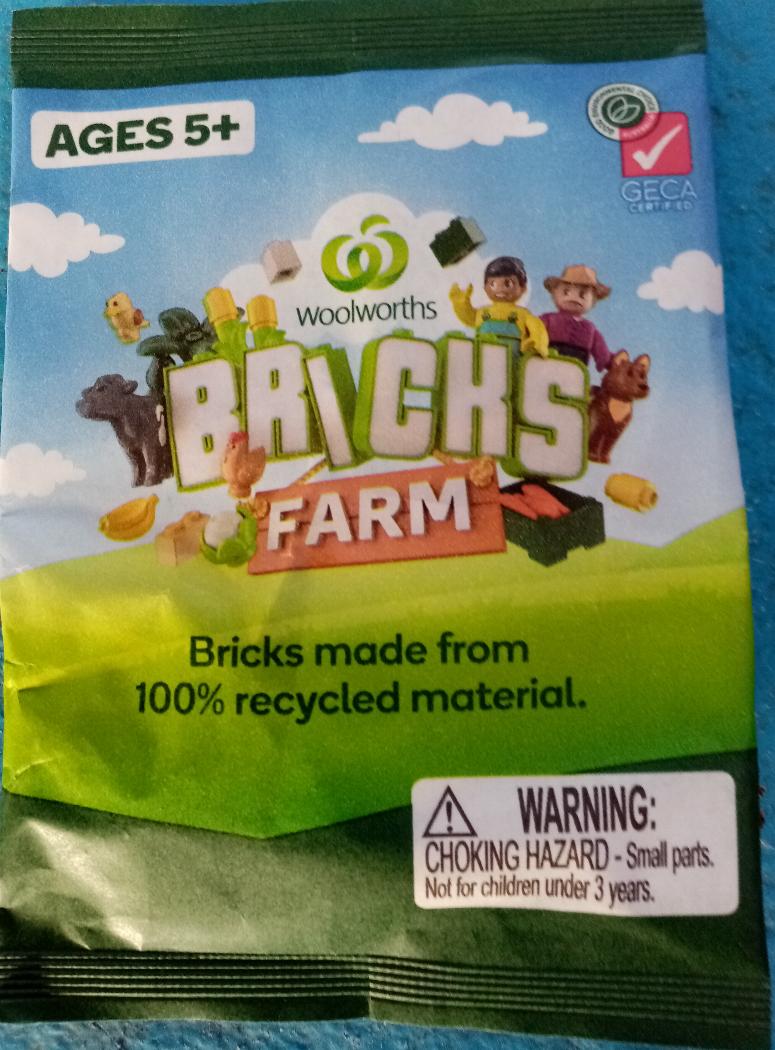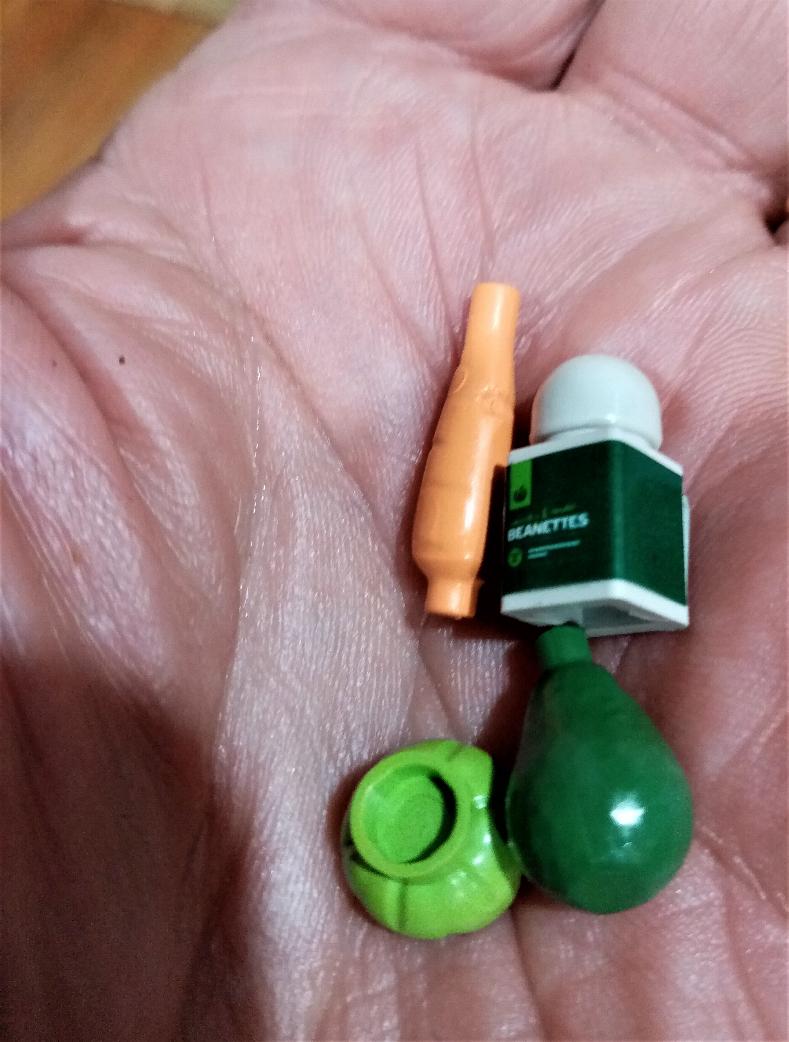“Fresh food people” and a rotten deal.
Written by: Nick G. on 20 February 2023
Australian Woolworths supermarket chain has recently launched the second in its Bricks series of Lego-like shopping rewards.
Spend $30 at Woolworths and you will be offered one packet of the toys.
The toys are a crass commercial ploy to enthuse young children about the Woolworths shopping experience.
Like competitor Coles which ran a similar promotion some time back, offering miniaturized models of commodities sold in its stores, Woolworths promotes its own items for sale. In the picture of the hand-held items is a miniaturized packet of Woolworths Beanettes.
Woolworths claims to be promoting not its consumer goods, but “learning about where food comes from through play and creativity.”
No matter how much is tries to pass of its consumer grooming of young children as “education”, the fact remains that it is baiting its hooks with dangerous playthings. The “food items” are generally around 1-2 cm long, easily swallowable by young children. The fact that they represent “foods” may well encourage this.
Their legal team has tried to deflect criticism – and possible legal action – by labelling the packages as for Ages 5+, with a Choking Hazard Warning Sign that says “Not for children under 3 years”.
But how many five year-olds with younger siblings will understand the consequences of leaving these items laying around the house?
The promotional items are branded as being “made from 100% recycled material” and recyclable packaging, and even carry a GECA (Good Environmental Choice Australia) red tick of approval.
For the sake of trying to groom young kids as Woolworths consumers (and through them, encourage parents and grandparents to shop at Woolworths stores), Woolworths is pumping more and more plastics into the environment. It is doubtful that many parents will read the fine print on the packaging that acknowledges this problem by telling them that “To recycle your Woolworths Bricks, simply return your bricks to any participating Woolworths store”.
Woolworths is one of two giant monopolies which make their money at the expense of those with the least power in the food supply chain – farmers and consumers.
In 2019, the NSW Farmers Federation reported:
AUSTRALIA has the most concentrated supermarket sector in the world, with a 70% market share for Coles and Woolworths, and 90% market share in the hands of just four supermarkets. It means Australian farmers are exposed to highly concentrated domestic markets with these powerful supermarkets and processors.
Having to deal with large organisations with significant market and bargaining power has meant farmers’ margins have been squeezed, often to below the cost of production. Supermarkets have introduced private labels and exclusive supply chains, entrenching their power and reducing competition.
Their complaints, and others from around Australia led the federal government to announce a voluntary code of conduct for the supermarket sector in 2021.
Despite the code, the ABC reported on December 11 2021 that “An independent review of how the big supermarkets treat their suppliers has found that many are too afraid to complain. Suppliers have accused the supermarkets of cancelling contracts, moving products to the bottom shelf and making payments late if suppliers ask for a price rise or make a complaint.”
The Financial Review reported on June 22, 2022:
A host of food industry and farmer organisations representing $220 billion in sales has met with officials from the Australian Competition and Consumer Commission to air concerns that soaring inflation and the market clout of Coles and Woolworths could result in an increasing corporatisation of the food supply chain.
The Food Industry Alliance has been established to try to convince policymakers and regulators that more needs to be done to ensure that smaller, independent operators, including farmers, local butchers and greengrocers, food distributors and independent supermarket retailers, have a level playing field as cost inputs jump.
The Australian Tax Office’s 2020-21 Corporate Report of Entity Tax Information revealed that Woolworths had revenue of $49,832,631,285 with a calculated taxable income of $2,496,780,963 (ie 1/19th of its revenue), of which it actually paid $636,499,375 (or 1/78th of its revenue).
This is the company that was fined a million dollars for breaching spam laws in excess of 5 million times and failing to unsubscribe customers from their mailing lists when requested to do so.
This is the company that was forced to admit in 2019 to having not paid millions of dollars to its employees.
If Woolworths was really interested in promoting an understanding of where food comes from, a better alternative might be a game of snakes and ladders in which Woolies’ profits are the up ladders, and farmers and growers, transport drivers, warehouse workers, supermarket employees and consumers are all sliding down the snakes.
And it could be made from non-swallowable recyclable materials with a GECA red tick of approval.
Print Version - new window Email article
-----
Go back
Independence from Imperialism
People's Rights & Liberties
Community and Environment
Marxism Today
International
Articles
| Large rally and march in Adelaide to celebrate first people's struggles and culture |
| Why Australia’s “deforestation” ranking ignores deforestation |
| SA toxic algal bloom persists under wintry conditions |
| Drought |
| Book Review: Terraglossia |
| Residential aged care - for people's needs or private profit? |
| The challenge of environmentalism in modern Australia |
| Fleurieu Peninsula marine deaths a sign of global warming’s existential dangers |
| Palestinian cultural day in SA |
| Federal government breaks critical environmental promise |
| Book Review: Mood Machine The rise of Spotify and the costs of the perfect Playlist |
| Albanese to weaken environment laws for foreign salmon farmers |
| Listen to people so as to improve mass work |
| The cars that ate suburban streets |
| Woolworths and Coles face working-class backlash |
| Book Review: Juice, by Tim Winton |
| People's Health and Safety More Important Than Nuclear Power |
| New Government Housing Scheme - Does It Create Affordable Housing? |
| US Capital Eyeing Rented Apartment Market |
| American mining giant destroys Australia’s native forests |
-----


